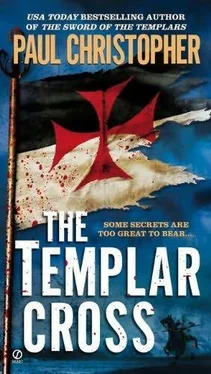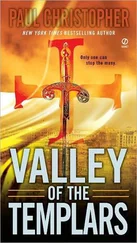Paul Christopher - The Templar Cross
Здесь есть возможность читать онлайн «Paul Christopher - The Templar Cross» весь текст электронной книги совершенно бесплатно (целиком полную версию без сокращений). В некоторых случаях можно слушать аудио, скачать через торрент в формате fb2 и присутствует краткое содержание. Жанр: Триллер, на английском языке. Описание произведения, (предисловие) а так же отзывы посетителей доступны на портале библиотеки ЛибКат.
- Название:The Templar Cross
- Автор:
- Жанр:
- Год:неизвестен
- ISBN:нет данных
- Рейтинг книги:5 / 5. Голосов: 1
-
Избранное:Добавить в избранное
- Отзывы:
-
Ваша оценка:
- 100
- 1
- 2
- 3
- 4
- 5
The Templar Cross: краткое содержание, описание и аннотация
Предлагаем к чтению аннотацию, описание, краткое содержание или предисловие (зависит от того, что написал сам автор книги «The Templar Cross»). Если вы не нашли необходимую информацию о книге — напишите в комментариях, мы постараемся отыскать её.
The Templar Cross — читать онлайн бесплатно полную книгу (весь текст) целиком
Ниже представлен текст книги, разбитый по страницам. Система сохранения места последней прочитанной страницы, позволяет с удобством читать онлайн бесплатно книгу «The Templar Cross», без необходимости каждый раз заново искать на чём Вы остановились. Поставьте закладку, и сможете в любой момент перейти на страницу, на которой закончили чтение.
Интервал:
Закладка:
"You think he'll get away?" Holliday asked.
"Yes," said Tidyman simply. "He would have had some kind of bolt hole arranged, some kind of plan B. He always did."
"And when he finds his airplane gone?" Holliday said. "Will he figure it out and come after us?"
"Count on it." The Egyptian nodded. "When he doesn't find our bodies he'll know. He had an awful temper when he didn't get his way. This will put him right over the edge. He'll come for us with blood in his eye, believe me."
Flying at just under one hundred and fifty miles an hour to conserve fuel, the eight-hundred-mile flight over the desert took them until just past midnight to complete. The moon was at its zenith as they crossed the Libyan border, throwing the landscape beneath their wings into sharp relief.
"The only thing I know about modern Tunisia is that George Lucas shot the Tattooine scenes on Luke Skywalker's home planet in a real place called Tattooine," said Holliday, looking down at the desert landscape below. It didn't look any different from most of Libya.
"That's here, in the south of the country," replied Tidyman. "The country's divided in half: the bottom is barren desert, the top is good farmland, Mediterranean, like the south of Spain or Greece, lots of hills and fertile valleys. They do pretty well for such a small country sandwiched between two big ones."
"Carthago delenda est," said Rafi, half dozing in the seat behind the copilot's spot. " 'Carthage must be destroyed'; first thing I ever learned in Latin."
"The Kasserine Pass," offered Holliday. "The first time American soldiers met up with the Germans in World War Two. We got our asses handed to us on a plate. One of the worst defeats in American military history."
"Good thing you were quick learners," said Tidyman. He eased the yoke forward and the little airplane went into a shallow dive, the sound of the fore and aft engines deepening.
"Why are we going down?" Holliday asked.
"Trying to get under the radar," explained Tidyman.
"Will they be looking for us?" Rafi asked.
"Not likely," said the Egyptian. "But the commercial airport at Tunis or the smaller one at Bizerte might pick us up accidentally; we're up pretty high for a light plane; they might be a little suspicious if we suddenly pop up on their screens coming out of the desert."
"Then take us down by all means," said Holliday.
They dropped steadily until they were flying at less than a thousand feet above the dunes and arid plains of the desert. Ahead, visible now in the far distance, the wall of the jagged Atlas Mountains stood like a blank, black shadow blocking out the star-lit skies. Abruptly the landscape changed. The desert vanished, replaced by small farms, roads and scattered settlements. The plains became more undulating, spotted with wooded hills that climbed straight-walled, like fortresses still waiting for an ancient enemy. Slowly but surely Holliday watched as the needle of the illuminated compass on the control panel swung to the east.
"Where is this airfield?" Holliday asked at the end of their fourth hour in the air.
"Matfur," replied Tidyman. "It was a fighter base in a dry lake bed," he explained. "Both sides occupied it at one time or another during the war. My father called it Muddy Matfur. Originally German, I think. Nobody uses it anymore, of course, it's just a line in the dirt really."
"And why exactly are we going there?" Rafi asked.
"If we put down at one of the big airports someone will almost certainly ask questions," answered Tidyman. "If Alhazred or Ayoub or whatever his name is does come after us, we'll be harder to find. It's closer to Kelibia than anywhere else."
"Kelibia?"
"A little coastal town on the Cape Bon peninsula, the other side of the Bay of Tunis," said Tidyman. "A dusty little place with hardly any tourists. There's an old fort but that's about it. It's where they ship the women out. It's where the Khamsin docks."
"Get us there," said Rafi.
An hour's flying brought them to Matfur, a small village at the foot of a bleak, treeless hill surrounded by a pancake-flat plain of smallholdings. In the waning moonlight Tidyman found the lake bed without any difficulty and put the plane down in a perfect three- point landing on the long-abandoned airfield, now little more than a slightly raised track through dry, cracked mud. He taxied the plane around, bringing it into the wind, then switched off the engines. The propellers clattered and whined to a stop and for the first time since they'd taken off from the desert camp in Libya there was silence.
"Now what?" Holliday asked.
"Now we steal a car," said Tidyman. "And get ourselves to the coast."
19
As things turned out, they didn't steal a car. They bought a truck, a World War II-vintage Austin Champ left behind in 1943 and pressed into service on a chicken farm owned by a man named Mahmoud. The truck and five gallons of gas were purchased for fifty dollars American and the ignition key for the Cessna Skymaster they'd left behind on the old airfield. Mahmoud also threw in an early breakfast of freshly slaughtered, plucked and baked chicken with a side dish of couscous and several pots of strong coffee.
For a few extra American dollars Mahmoud also let them have their pick from his meager wardrobe of Western-style clothes, managing to outfit Rafi and Holliday in well-worn collarless shirts and floppy, outsized trousers that seemed to have been made for someone who had been both short as well as enormously fat. By daybreak, after a revolting and appetite-suppressing tour of Mahmoud's farm and directions to the coast, they were on their way.
The trip in the old truck took less than two hours but Holliday was sure the stink of chicken guano would be with him forever.
Tidyman's brief description of the town of Kelibia was entirely accurate. A large fort dating back to the Roman occupation dominated the dusty whitewashed town from a steep hill, and that was about it except for the stink of fish, which immediately began fighting the acid reek of chicken droppings for dominance in their nostrils.
Most of the town seemed to have grown from an intersection of two major roads spreading out in a thoughtless tangle of narrow side streets that had grown over the passing years like a plaster and whitewash virus with no plan or direction. The real focus of the town beyond the obvious power of the vacant fortress was the harbor with its fleet of fishing trawlers and feluccas. According to Tidyman Kelibia was not one of the sanitized Zones Touristique, which might have accounted for the litter on the streets and the putrid, filthy water in the harbor. The boats, of all sizes and most needing a coat of paint, were moored four or five deep in a helter-skelter mess that defied any logic or order.
They eventually found the immigration capitanerie and harbor master's office in a small building beside an enormous concrete-roofed open-air fish market right on the waterfront. The office was a cupboard with a desk, a chair, a grimy window and stacks of papers on top of ancient green filing cases. The room smelled of stale tobacco and rotting wood.
The harbor master's name was Habib Mokaden, a squat little man who wore his pants up to his armpits and had a magnificent head of silver curly hair topped off with a bright green fez. His pouched face was covered with a sandpapery stubble of gray bristles and he smoked endless Mars brand cigarettes, tapping them out of a bright red package and popping them in the exact center of his fat and wet-lipped mouth. He spoke tolerable English.
"I am aware of this vessel, yes," he said and nodded when Tidyman asked about the Khamsin. Holliday didn't quite believe it considering the mess of shipping in the harbor, most of the boats nameless.
Читать дальшеИнтервал:
Закладка:
Похожие книги на «The Templar Cross»
Представляем Вашему вниманию похожие книги на «The Templar Cross» списком для выбора. Мы отобрали схожую по названию и смыслу литературу в надежде предоставить читателям больше вариантов отыскать новые, интересные, ещё непрочитанные произведения.
Обсуждение, отзывы о книге «The Templar Cross» и просто собственные мнения читателей. Оставьте ваши комментарии, напишите, что Вы думаете о произведении, его смысле или главных героях. Укажите что конкретно понравилось, а что нет, и почему Вы так считаете.











